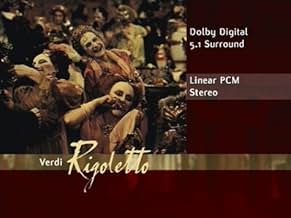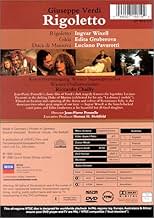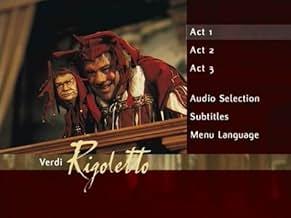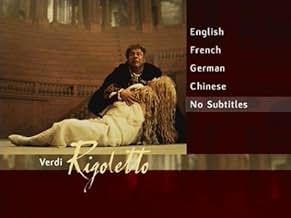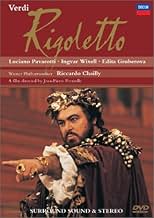Agrega una trama en tu idiomaThe Duke lives the high life. The court jester taunts too well. Revenge has unintended consequences both times it is attempted.The Duke lives the high life. The court jester taunts too well. Revenge has unintended consequences both times it is attempted.The Duke lives the high life. The court jester taunts too well. Revenge has unintended consequences both times it is attempted.
- Dirección
- Guionistas
- Elenco
Bernd Weikl
- Marullo
- (doblaje en canto)
- Dirección
- Guionistas
- Todo el elenco y el equipo
- Producción, taquilla y más en IMDbPro
Opiniones destacadas
Pavarotti and the entire cast are superb in this beautifully filmed opera by Giuseppe Verdi, the world's finest composer of operas. The coloratura soprano is particularly spectacular with her perfect pitch. The title role is well-enacted and well-sung. The entire production is as perfect as one could expect.
A masterpiece of cinematography!
A masterpiece of cinematography!
I have been a huge fan of opera and classical music since a very early age. And I love Rigoletto, it has a fine story with wonderfully rendered characters. And of course, you can't talk of Rigoletto without mentioning Verdi's music, as is always the case with Verdi, it is outstanding. And this is not just "La Donna e mobile", Gilda's "Caro Nome" and the Quartet, the three best known bits.
I don't know about anybody else, but my personal favourite aria is Duke of Mantua's "Ella mi fu rapita...parmi veder Le lagrime", not just for the energetic start but then with the wonderfully lyrical and poignant second half of the aria, which for me shows that although the Duke is ruthless and a bit of a scoundrel he also has genuine feelings for Gilda. Another favourite is "Si vendetta, tremenda vendetta" which is so powerful when sung really well, the case here, like with Rigoletto's superb Cortigiani.
This 1982 film from Jean Pierre Ponelle is one of my favourite opera films ever, and I have seen a lot. The production values are exquisite, the camera shots are appropriately used, the location shots are breathtaking and we are also treated to lavish costumes and settings. And the singing and acting are top drawer, and helped hugely by the exemplary direction of Jean-Pierre Ponnelle.
Luciano Pavarotti is wonderful as the Duke, I have always been accustomed to his voice(one you recognise immediately upon hearing) which is so effortless at the top if not so much his acting, I can find him a kind of "stand-and-sing" sort of singer. Here though, Pavarotti does show some believable acting ability(see his playful eye contact in "Questo o quella" for instance) and is in great voice. He sings "La Donna e mobile" with real vigour and sings "ella mi fu rapita...parmi veder Le lagrime" beautifully, even if I do slightly prefer Placido Domingo's more poised and thoughtful recording of it under the baton of Sherrill Milnes(who along with Wixell is my personal favourite Rigoletto).
Pavarotti is supported solidly by some quite talented singers and actors. While occasionally a little on the sweet side as Gilda, Edita Gruberova does show a wondrous colouratura register and is suitably vulnerable and ethereal, and even better with the best acting of all the principles-being able to show so many dimensions to the character and wonderfully- is Ingvar Wixell as both Rigoletto and Monterone, which provided a very interesting parallel slant.
All in all, wonderful and I can say it is one of my personal favourites as of now. 10/10 Bethany Cox
I don't know about anybody else, but my personal favourite aria is Duke of Mantua's "Ella mi fu rapita...parmi veder Le lagrime", not just for the energetic start but then with the wonderfully lyrical and poignant second half of the aria, which for me shows that although the Duke is ruthless and a bit of a scoundrel he also has genuine feelings for Gilda. Another favourite is "Si vendetta, tremenda vendetta" which is so powerful when sung really well, the case here, like with Rigoletto's superb Cortigiani.
This 1982 film from Jean Pierre Ponelle is one of my favourite opera films ever, and I have seen a lot. The production values are exquisite, the camera shots are appropriately used, the location shots are breathtaking and we are also treated to lavish costumes and settings. And the singing and acting are top drawer, and helped hugely by the exemplary direction of Jean-Pierre Ponnelle.
Luciano Pavarotti is wonderful as the Duke, I have always been accustomed to his voice(one you recognise immediately upon hearing) which is so effortless at the top if not so much his acting, I can find him a kind of "stand-and-sing" sort of singer. Here though, Pavarotti does show some believable acting ability(see his playful eye contact in "Questo o quella" for instance) and is in great voice. He sings "La Donna e mobile" with real vigour and sings "ella mi fu rapita...parmi veder Le lagrime" beautifully, even if I do slightly prefer Placido Domingo's more poised and thoughtful recording of it under the baton of Sherrill Milnes(who along with Wixell is my personal favourite Rigoletto).
Pavarotti is supported solidly by some quite talented singers and actors. While occasionally a little on the sweet side as Gilda, Edita Gruberova does show a wondrous colouratura register and is suitably vulnerable and ethereal, and even better with the best acting of all the principles-being able to show so many dimensions to the character and wonderfully- is Ingvar Wixell as both Rigoletto and Monterone, which provided a very interesting parallel slant.
All in all, wonderful and I can say it is one of my personal favourites as of now. 10/10 Bethany Cox
There is really nothing to say about the musical aspects of this production:it's all very well-done.We have to look at the directoral touches that Ponnelle has left on the production.And,boy,he wrote his name on this in red paint.First,I think that Ponnelle has an obsession with the early Renaissance-look where he placed "The Coronation of Poppea".And Rigoletto is not an early,but a middle Renaissance setting.The ducal court is not only licentious,but also depraved and unsanitary.Mice in the salad!And the party at the beginning throws in everything including the kitchen sink.The minor characters are all strikingly portrayed-and Bracht's cyclopean Ceprano is a physical indication of the corruption and taint of the court.Pavarotti,as the Duke,is a case-book psychopath.Lusty,charming,extroverted,and a creature at the mercy of his appetites and impulses,he lacks the faintest trace of mercy,compassion,and decency.Violent,vicious,and totally without morals,he will,and does destroy anyone who gets in his way.Interesting idea to have Wixell play both Rigoletto and Count Monterone-emphasizes the parallel between the two characters,but you could only do it in a film.Furlanetto's Sparafucile is a clinical example of Paranoid Schizophrenia;this guy is not living in the same reality that the rest of us inhabit.And Gruberova's Gilda,splendidly sung,is a little too sweet for my tastes;the character should display some ambiguous traits.The emphasis in this production is on evil,corruption,depravity,and every other noxious trait on the list.Save Gilda(and the Count of Monterone)none of these portrayals offers a redeeming grace.
But this is not an Opera filmed on a theater. It is a movie. As such the scenes are not of a theatrical production and many are in exteriors. You will not see the Orchestra pit nor the Maestro.
This requires singers that are also good actors. Pavarotti, not always a good actor in the stage, comes out superb, but the best acting performance is Ingvar Wixell, as Rigoletto.
The female roles are very inferior. Edita Gruberova is totally visually inadequate for the role of Gilda, She looks like an old witch, and totally ruins all her scenes. Madallena is a bit more credible as a "putanna", with some feelings.
This requires singers that are also good actors. Pavarotti, not always a good actor in the stage, comes out superb, but the best acting performance is Ingvar Wixell, as Rigoletto.
The female roles are very inferior. Edita Gruberova is totally visually inadequate for the role of Gilda, She looks like an old witch, and totally ruins all her scenes. Madallena is a bit more credible as a "putanna", with some feelings.
Jean-Pierre Ponnelle made many opera films between 1974 and 1988. This was at a time when it was unusual and technically quite difficult to record live performances of operas on stage. Ponnelle tended to make operas look like Hollywood musicals. They have high production values and are visually attractive. The performers are world-class but the singing is dubbed and the films have an artificial look about them. I am aware of the irony of complaining that Ponnelle's opera productions look artificial: what could be more artificial than people singing a story on a stage? But we accept opera within its own conventions. If the singers are not singing it looks phoney. If the performers are not doing it for real you can tell because they are not putting enough effort into it. It's a bit like soft core pornography I suppose.
This production from 1982 stars Luciano Pavarotti, who was then probably at the peak of his powers. He sounds wonderful but he has never been noted for his acting ability. He can put over an aria if he is really singing but when he is miming he has a frightened look in his eyes. Furthermore, it looks as if Pavarotti was rarely in the studio at the same time as the rest of the cast. I think only in his duet with Gilda does he appear in the frame simultaneously with another performer. It looks as though he recorded his part separately. For all I know he was probably in a different continent when the rest of the cast were making the film.
Edita Gruberova is a shrill Gilda. Ingvar Wixell is a most unsympathetic Rigoletto. He also doubles the part of Monterone. This only serves to underline the artificiality of the enterprise. The only reason I bothered to review this film is that it is still doing the rounds on a British arts channel. I actually pay a subscription to see things like this. The following night, I watched a recording of the wonderful 2001 Covent Garden production of the same opera. It is reassuring to see how far the filming of opera has advanced in the last 20 years.
This production from 1982 stars Luciano Pavarotti, who was then probably at the peak of his powers. He sounds wonderful but he has never been noted for his acting ability. He can put over an aria if he is really singing but when he is miming he has a frightened look in his eyes. Furthermore, it looks as if Pavarotti was rarely in the studio at the same time as the rest of the cast. I think only in his duet with Gilda does he appear in the frame simultaneously with another performer. It looks as though he recorded his part separately. For all I know he was probably in a different continent when the rest of the cast were making the film.
Edita Gruberova is a shrill Gilda. Ingvar Wixell is a most unsympathetic Rigoletto. He also doubles the part of Monterone. This only serves to underline the artificiality of the enterprise. The only reason I bothered to review this film is that it is still doing the rounds on a British arts channel. I actually pay a subscription to see things like this. The following night, I watched a recording of the wonderful 2001 Covent Garden production of the same opera. It is reassuring to see how far the filming of opera has advanced in the last 20 years.
¿Sabías que…?
- ConexionesVersion of Rigoletto (1908)
Selecciones populares
Inicia sesión para calificar y agrega a la lista de videos para obtener recomendaciones personalizadas
Detalles
- Tiempo de ejecución
- 2h 8min(128 min)
- Color
- Relación de aspecto
- 1.37 : 1
Contribuir a esta página
Sugiere una edición o agrega el contenido que falta


